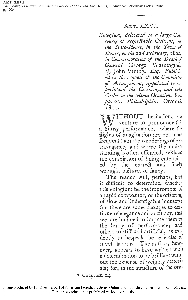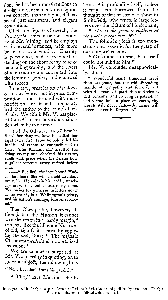 ―206― ―206―
Art. XXVI.
Eulogium, delivered to a large Con-
course of respectable Citizens, at
the State-House, in the Town of
Dover, on the 22d February, 1800,
in Commemoration of the Death of
General George Washington.
By John Vining, Esq. Publish-
ed at the request of the Committee
of Arrangement, appointed to su-
perintend the Ceremony, and take
Order on the solemn Occasion. 8vo.
pp. 20. Philadelphia. Ormrod.
1800.
WITHOUT hesitation, we
venture to pronounce this
a flimsy performance, where the
flights of imagination are not more
frequent than the wanderings of ex-
travagance, and where the under-
standing is often offended, without
the consolation of being entertain-
ed by the correct and finely
wrought pictures of fancy.
The reader will, perhaps, find
it difficult to determine, whether
this eulogium be the impromptu of
a rapid compositor, or the offspring
of slow and indefatigable industry;
for there are some passages so des-
titute of elegance and accuracy, that
we are inclined to impute them to
the hurry of performance; and
others so stiff and artificial, as evi-
dently to bespeak the exercise of
much labour. The author, how-
ever, appears to have written with
a determination to be brilliant with-
out the expense of weighty materi-
als; for, in the structure of the ora-
* Chap. lix. 14.
 ―207― ―207―
tion, he has been more studious to
display tinsel ornament, and figura-
tive conceit, than to lay a solid ba-
sis of just sentiment, and elegant
conception.
Of all the figures of speech, the
Prosopopoia seems to be the favour-
ite of Mr. Vining, and he employs
it, in several instances, with more
boldness than ingenuity. Eternity
is personified, and represented as
standing on the shore ready to seize
on a sailing trophy; and the rivers
of our country are converted into
the feminine gender, and endowed
with speech.
In poetry, great latitude is allow-
ed to this figure, but in prose com-
position it must be used with more
restriction, or it will frequently
lead the author to the brink of ri-
dicule. We think Mr. V. has plac-
ed himself in an hazardous situa-
tion when he exclaims:
“Yes! the Delaware can tell how he
defied her dangers, how he passed her
rapid cataracts! How he boldly led his
handful of troops to conquest and to
fame. The Raritan, that arrested the
flying enemy and checked his retreat,
swells with pride when she relates how
a gallant veteran army retired before
him.
—“But shall the iron bound Hud-
son be silent? She who beheld an infant
army, like Hercules in his cradle, attack-
ing every foe, and defeated by none.
Yes, on her hardy margin, in letters never
to be erased, is a Washington's glory,
and his nation's courage, forever record-
ed.”
The Chesapeake, however, al-
though like the Hudson it cannot
write letters on its “hardy margin,”
can yet, like the illiterate Normans
of old, signify its assent by apply-
ing the seal, thus: “The majestic
Chesapeake sealed and immortalized
his valour.”
We are somewhat surprised at
Mr. V.'s puerility in quoting, on so
grave a subject, the following line.
“None but himself was his parallel.”
“This,” says Martinus Scrib-
lerus, “is profundity itself, unless
it may seem borrowed from the
thought of that master of a show in
Smithfield, who wrote in large let-
ters over the picture of his elephant.
“This is the greatest elephant in
the world except himself.”
The following idea is too mon-
strous and gigantic for the grasp of
our comprehension.
“Great and sublime, Fate itself
could not subdue him.”
Mr. V. concludes metaphorical-
ly, thus:
“Wonderful man! Immortal hero!
thou art gone, but the wide-spreading
mantle of sympathy and sorrow, wet
with the tears of patriotism and virtue,
still remains, and so long as patriotism
and virtue hold a place on earth, thy
laurels will never fade—thy name will
never—never be forgotten.”
|